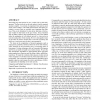Free Online Productivity Tools
i2Speak
i2Symbol
i2OCR
iTex2Img
iWeb2Print
iWeb2Shot
i2Type
iPdf2Split
iPdf2Merge
i2Bopomofo
i2Arabic
i2Style
i2Image
i2PDF
iLatex2Rtf
Sci2ools
142
click to vote
PODS
2008
ACM
2008
ACM
Time-decaying aggregates in out-of-order streams
Processing large data streams is now a major topic in data management. The data involved can be truly massive, and the required analyses complex. In a stream of sequential events such as stock feeds, sensor readings, or IP traffic measurements, data tuples pertaining to recent events are typically more important than older ones. This can be formalized via time-decay functions, which assign weights to data based on the age of data. Decay functions such as sliding windows and exponential decay have been studied under the assumption of well-ordered arrivals, i.e., data arrives in non-decreasing order of time stamps. However, data quality issues are prevalent in massive streams (due to network asynchrony and delays etc.), and correct arrival order is not guaranteed. We focus on the computation of decayed aggregates such as range queries, quantiles, and heavy hitters on out-of-order streams, where elements do not necessarily arrive in increasing order of timestamps. Existing techniques suc...
| Added | 08 Dec 2009 |
| Updated | 08 Dec 2009 |
| Type | Conference |
| Year | 2008 |
| Where | PODS |
| Authors | Graham Cormode, Flip Korn, Srikanta Tirthapura |
Comments (0)

